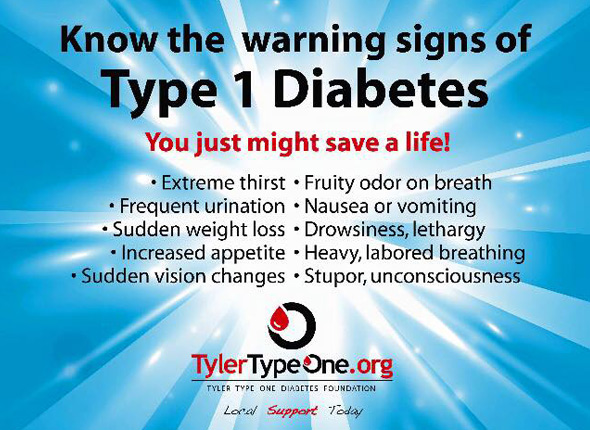Kycie Terry’s Type 1 Diabetes Fight and Death Heard by Many

5-year-old Kycie Terry’s fight continues to be heard by thousands, even after her death on July 11.
On Saturday July 11, 2015, a post appeared on Facebook that shook the diabetes community and beyond. Five-year-old Kycie Terry, diagnosed with Type 1 diabetes less than six months ago, had passed away. It was the kind of news that you have to read twice and even a third time, hoping that somehow you’re misreading it. Back on January 30, Kycie had suffered severe brain damage after Type 1 diabetes went undiagnosed for roughly five days. Her doctor initially thought that she had strep throat and sent her home with antibiotics. Two days later, her blood sugar had reached 1,148 (normal is 80-120). She experienced seizures and became unresponsive after being life-flighted from a local ER to a better equipped children’s hospital. Doctors informed her parents, Josh and Jamie, that Kycie’s brain had herniated into the brain stem. If she survived, she would be severely handicapped. Little did anyone know how much fight was left in Kycie.
She opened her eyes and would spend a total of 111 days in the hospital, relearning everything from swallowing to sitting up. She could not speak and her parents longed to hear her first words again. Josh and Jamie began to share their daughter’s recovery via the Facebook page Kisses for Kycie, which has amassed over 54,000 followers since its creation. After Kycie was released from the hospital, the local community welcomed her home with a hero’s celebration, lining the street and holding up signs as Josh and Terry fought back tears of gratitude as they carried their daughter inside. Like so many others, I followed Kycie’s rehabilitation, her ups and downs, and her little triumphs that were anything but small, always amazed by her bravery and the courage of her parents.

Our immediate instinct is to ask why. How could God take someone so young? If only we could find a way to turn back the clock and warn them. After all, how could a doctor miss the diagnosis? The tragic truth is that it is not uncommon for Type 1 diabetes to go undiagnosed and be misdiagnosed. I know this because it happened to me. In 2004, after exhibiting extreme thirst, frequent urination, sudden weight loss, and changes to my vision (it temporarily went back to 20/20), I visited my family doctor. I told him that I looked my symptoms up online and thought that I might have diabetes. “First off,” he said, “you can’t believe what you read online, and I really doubt that you have diabetes.” Feeling slightly relieved, they drew blood at the office and sent it out to a lab. I asked if I should change my diet and eat less sugar in the meantime. “No,” he said. “Let’s wait until the bloodwork comes back. It’s unlikely you have diabetes.” A simple finger prick at the office would have shown a much different picture. Instead, like Kycie, they sent me home.
Over the next couple days, my symptoms worsened. My appetite increased and I began to crave sugar. I started to feel strange, lethargic, and at times my body felt like it was on the wrong wavelength, kind of like an appliance that is getting too much juice from an outlet. I don’t know how high my blood sugar got, but after hearing about stories like Kycie’s, I feel very lucky. The doctor’s office eventually called to inform me that the bloodwork indicated diabetes. I went back for another appointment. I then went to see a specialist, a doctor I later found out was on the verge of retiring. A nurse took me back to an exam room to wait. I could hear him down the hall in his office talking on the phone about his golf game. This went on for approximately twenty minutes and then he finally appeared. He wanted to do more blood work, but he was diagnosing it as Type 2 diabetes. He prescribed Metformin and sent me home. More days passed and then the additional blood work came back. The diagnosis was changed to Type 1 diabetes.
It’s been eleven years and the thought of the experience surrounding my diagnosis (or lack thereof) still infuriates me. I can remember the leave-it-to-the-experts smirk on my primary care physician’s face when I told him I tried to self-diagnose online, as if I had done something foolish. Yet, why wasn’t a simple finger prick done to test my blood sugar at the office when all of my symptoms pointed to diabetes? How could a “specialist” then look at a trim, healthy looking 27-year-old and make a diagnosis of Type 2 diabetes? Ultimately, why has there been such a lack of awareness, especially among doctors?
As these questions continue to frustrate me and many others in the diabetes community, there is one question whose answer has become clearer. Why Kycie? Why did she survive to fight for more than five months, only to be taken from this world? In trying to wrap my head around this, I thought about her more than 50,000 followers on Facebook and the thousands of others who likely saw their “likes,” comments, and “shares.” Then there are the many news articles that have been written about Kycie, and her YouTube videos that have amassed a total of several hundred thousand views and counting. In addition, television news broadcasts have shared Kycie’s story. I soon realized that Kycie Terry, a 5-year-old girl who never regained her speech, had likely been heard by more than a million people and will undoubtedly be heard by millions more.
Even though it’s hard to face at the moment, the purpose of Kycie’s life and her inspiring fight was already being revealed prior to her death, as evidenced by a July 5 Kisses for Kycie post.
“We just received our newest story from a mom of a recently diagnosed child. Her friend shared one of these awareness graphics 2 weeks ago, the mom saw these signs in her 15 yr old son, took him to the ER, and he tested at 600+ blood sugars.”






 My name is Kevin Lang and I am a Type 1 Diabetic who was diagnosed in May of 2004 at the age of 27. My last A1C was 6.0 in May 2015. I used to use daily shots of Lantus and Novolog to control my blood sugar until I switched to the MiniMed Paradigm Revel Insulin Pump in February 2011. To learn more about me, follow the about link in the menu bar.
My name is Kevin Lang and I am a Type 1 Diabetic who was diagnosed in May of 2004 at the age of 27. My last A1C was 6.0 in May 2015. I used to use daily shots of Lantus and Novolog to control my blood sugar until I switched to the MiniMed Paradigm Revel Insulin Pump in February 2011. To learn more about me, follow the about link in the menu bar.
Also heartburn and body cramps.
Heartburn seems to be more associated with Diabetic gastroparesis (delayed stomach emptying), a type of neuropathy that affects the digestive track. It is normally caused by high blood sugar over a long period of time that damages the vagus nerve. I haven’t heard of it being all that common at the onset of Type 1, unless the heartburn is being triggered by something else.
Sometimes I feel like I’m keeping my husband alive. I’m afraid to leave him alone with the kids and I can’t get a job. Is their a support group for families of diabetics? More so type 1. Type 2 groups are aggravating as they don’t understand.